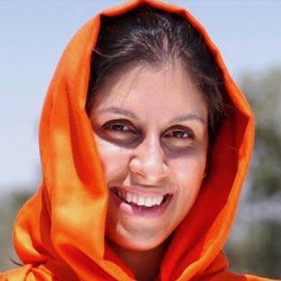News
Iran court dashes Thomson Reuters Foundation worker's 'last hope'
Monday 24 April 2017

Iran's supreme court has upheld the conviction of Thomson Reuters Foundation worker Nazanin Zaghari-Ratcliffe (photo), sentenced to five years in jail on non-specific charges relating to national security.
Her last hope of overturning the verdict through legal avenues have been dashed.
She had lodged a final appeal in January after confirmation of her sentence in a lower court.
Her husband, Richard Ratcliffe, said the supreme court had rejected her appeal.
“I hadn’t had great hopes for the supreme court appeal,” he said. “Now, realising that that’s it, that all options are gone … in the middle of an election cycle, it’s hard to get attention on Nazanin’s case.”
Iran’s presidential elections are to be held on 19 May; the UK goes to the polls in a general election on 8 June.
Zaghari-Ratcliffe, 38, has spent 387 days behind bars, most of which have been in Tehran’s Evin prison. Revolutionary Guards arrested her in April 2016 while she and her two-year-old daughter, Gabriella, were about to return to Britain after a family visit to Iran. She was tried and found guilty on the unspecified charges relating to national security in September.
Ratcliffe said the final appeal was submitted on 20 January. His wife’s lawyer received a telephone call on Tuesday to say that it had been rejected. “Her parents went with Gabriella to meet the judges in [the city of] Qom about a month ago, and only her mum and Gabriella were allowed in for about two minutes; there was no court hearing; on Tuesday her lawyer was told on the telephone and the family had a prison visit [on Sunday] and discussed [the rejection] with her,” he said.
Although the exact reasons behind Zaghari-Ratcliffe’s incarceration remain unclear, the Guards have accused her of attempting to orchestrate a “soft overthrow” of the Islamic Republic. An Iranian news agency affiliated to the country’s judiciary also said in April that she was a spy. Richard Ratcliffe has vehemently denied both allegations.
Earlier on Monday, Ratcliffe said in a statement that his wife still did not have firm details of the charges against her, insisted that she is innocent and criticised the UK’s handling of her case.
“As her husband, I can say Nazanin is innocent until I am blue in the face. I have spent a year doing it,” he said. “But it makes a clear difference that the government hasn’t. It indulges the whispers.”
He added: “She was a mum on holiday, who works for a development charity in London, whose crime seems to be that it gets funding from the UK government. That is not espionage, that is not attempting to overthrow a regime, and it is not working against national security.”
Ratcliffe said that they had asked the British government to speak out and to “say Nazanin is innocent of the allegations that she is a spy; to publicly call for her release now their conditions to do so have been reached, and to press again for the British ambassador to be allowed to visit - to check on her health and hear from her directly.”
Ratcliffe has previously claimed that his wife, who has dual nationality, is being used as a pawn in political deals with the UK. Nearly one million people have signed a petition on change.org calling on Iran to release her.
An official from the Iranian embassy in London told The Guardian that Zaghari-Ratcliffe has been detained “due to her illegal acts” and that the appeal has been rejected based on information from the country’s judiciary, which acts independently of President Hassan Rouhani’s government.
“While being in prison is not a pleasant experience, Mrs Zaghari has full access to [a] social worker, physician, medical care, medical services and other necessary facilities. She also has the right to regularly meet her family, including her parents and particularly her beloved kid,” the Iranian official said, adding that Richard Ratcliffe could apply for a visa to visit his wife “on humanitarian grounds”.
“It is worth mentioning that there are thousands of dual nationals who are travelling on a daily basis to Iran without any difficulty. Although dual nationality is not recognised by the Iranian law, Iranian dual nationals are respected as Iranian citizens,” the official added. “Dual nationality should not be seen, however, as an instrument to obstruct the application of the law. Dual nationals will be subjected to the same legal processes as other Iranian nationals when committing offences.”
Monique Villa, Thomson Reuters Foundation CEO, said the supreme court’s decision “extinguishes the last hope we have had of legally overturning a punishment where the crime remains a mystery”. She asked the Iranian authorities for clemency.
“She is not a spy, but an innocent mother who travelled to Iran only to show her baby to her parents,” said Villa.
She added that Zaghari-Ratcliffe has never had dealings with Iran in her professional capacity at the Thomson Reuters Foundation. ■
- SOURCE
- The Guardian
- « Previous
- Next »
- 685 of 2135